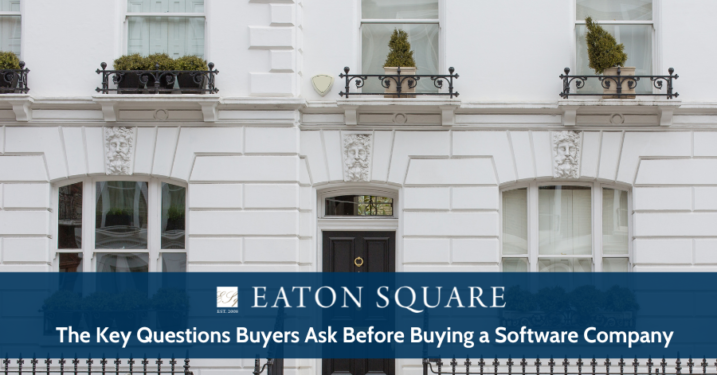
When it comes to selling your software company, understanding the mindset of potential buyers is crucial. At Eaton Square, we’ve worked with numerous software firms and have found that buyers, especially private equity (PE) firms, focus on key metrics and factors that determine what opportunities they will spend time considering and the potential attractiveness of an acquisition.
Many buyers want to know ARR, Churn Rate, Growth Rate and EBITDA before deciding to respond to a potential seller’s call or email. But sticking with the grand tradition of ‘top 10 questions’ we’ll go a bit deeper in this first blog of a two-part series, we will assume we have gotten past the front door and explore the first five of these qualifying questions that help potential buyers determine if they will spend serious time evaluating a purchase opportunity.
With financial acquirers such as Private Equity and Software Aggregators now accounting for nearly half of software business purchases, and the transition of most software sales to SaaS businesses models, it should come as no surprise most buyers questions first focus on ‘standard’ SaaS metrics to triage or quickly cull opportunities.
1. What is your Annual Recurring Revenue (ARR)
Annual Recurring Revenue (ARR). Everybody loves to talk about sticky recurring revenues, and it is easy to slip into the habit of speaking of ARR when referring to total revenue. When talking to potential buyers it helps to be specific about revenue mix upfront. Even rough ballpark revenue scale and composition numbers helps buyers quickly determine if an opportunity is in their ‘goldilocks zone’ – big enough to move the dial, but not so large as to be indigestible.
2. What’s your customer churn rate (CCR), net retention rate (NRR), customer acquisition cost (CAC), and estimated Customer Lifetime Value (LTV)?
Because SaaS business models are now mainstream, almost all investors are familiar with the basic metrics of SaaS unit economics and want a potential opportunity to ‘show not tell’ the calibre of the business by the numbers. Fortunately, the buyer universe is diverse so even if your metrics are not top quartile, there may still be buyers albeit at a difference price compared to a business with fantastic numbers.
3. How has your revenue grown year-over-year for the past 3 years, and what is your forecast growth for next year?
There are buyers who like high growth businesses and those who focus on acquiring more mature businesses. Understanding the strategies of potential buyers prior to approach helps sellers be more efficient in finding and engaging the buyers most likely to be interested.
4. What’s your current sales and marketing expenditure, gross margin, and EBITDA?
Or more simply put, tell us if you are losing money, profitable or really profitable either right now or are heading in that direction.
Amongst financial investors EBITDA is a convenient filtering measure to assess if a deal is in the sweet spot for their fund or acquisition strategy. EBITDA too large, then there is likely to be more competition from larger funds, EBITDA too small (and lacking without a great story as to why it is about to recover) then why waste time on something too small.
EBITDA is also an important filter for strategic acquirers – they may buy for other reasons, but it much easier to get on acquisition agenda if a deal is seen to ‘move the dial’
5. Who are your primary target customers, and what industries do they represent? Which geographic markets are they located in?
Let’s assume that our audience likes our ARR, Churn, Growth and EBITDA story. Next on the agenda is understanding your customer base. For strategic buyers, this probably comes first in considering whether to look at a deal. For financial investors, this question is key to assessing the potential for growth and risk of overreliance on a cyclical industry or a small number of customers.
Next Steps
In this first part of our blog, we’ve touched on the first ‘filtering’ level of questions buyers ask when initially deciding to invest time considering the purchase of a software company. In our next blog, we’ll delve into additional questions that sellers should anticipate early in an acquisition discussion.
Stay tuned for Part 2, where we dig in further so you as a potential seller can mentally prepare for buyers initial questions. If you’re considering selling your software company and want to ensure you’re fully prepared to answer these questions, contact us at Eaton Square. Our expertise in software M&A can help you navigate the complexities of selling your business, ensuring you achieve the best possible outcome.
